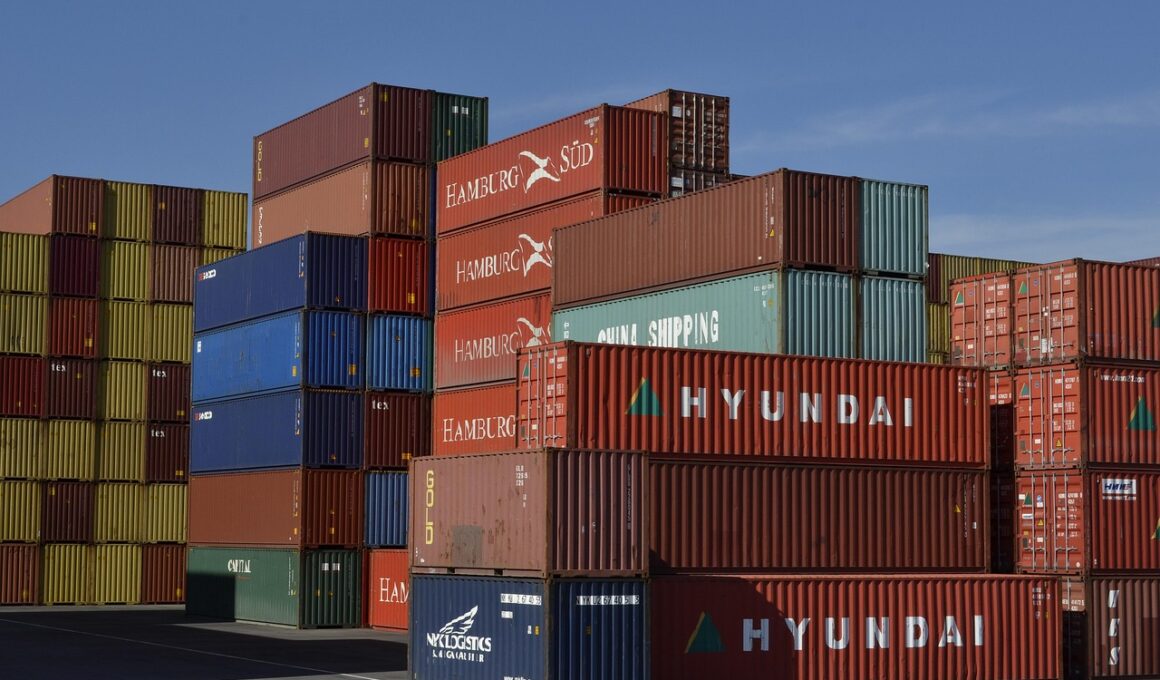Challenges in Customs Valuation and How to Overcome Them
Customs valuation plays a pivotal role in international trade, ensuring that goods are accurately assessed for duty and taxes. However, several challenges arise during this critical process. One significant issue is the complexity of pricing structures. Global companies often utilize varied pricing strategies that can confuse customs authorities. Another challenge arises from the differences in classification systems across countries, resulting in misclassification. Misunderstandings can lead to delays, fines, and additional costs. Inaccurate valuation also affects the competitive trade landscape, as businesses might pay more than necessary in customs duties. Moreover, fluctuating currency exchange rates add another layer of complexity, directly influencing the final declared value of goods. Companies must also cope with evolving international regulations and trade agreements that can impact valuation criteria. In such a challenging environment, businesses need efficient mechanisms to ensure compliance with customs regulations. By employing advanced technology and staying updated on international standards, companies can navigate these hurdles more effectively. Ultimately, understanding the intricacies of customs valuation can not only streamline processes but also lead to cost savings and enhanced operational efficiency.
Understanding the Importance of Accurate Valuation
Accurate customs valuation is crucial for global trade, as it directly affects pricing strategies and business profitability. Ensuring correct valuation helps companies maintain compliance with legal regulations. Moreover, accurate valuation strengthens a firm’s reputation and fosters trust with both customers and vendors. Understanding the true cost of goods, inclusive of taxes and duties, allows companies to set competitive prices. A company’s ability to negotiate better trade agreements often lies in its understanding of customs valuation. This knowledge also helps prevent unnecessary delays in the customs clearance process. When businesses face valuation disputes, they must prepare adequate documentation to justify their declared values. This often includes commercial invoices, contracts, and shipping documents. Inaccurate documentation can not only lead to disputes but also result in significant financial penalties. Furthermore, the increasing complexity of international trade suggests that accurate customs valuation will become even more significant. Engaging experienced customs brokers can further enhance the accuracy of valuations. They can provide insights into country-specific customs practices, making the process more efficient. Ultimately, accurate valuation enhances overall trade facilitation.
Another major hurdle companies face concerning customs valuation is navigating various valuation methods. There are several methodologies mandated by the World Trade Organization (WTO), including transaction value, deductive value, and computed value. Choosing the correct method can be daunting and requires a deep understanding of the specific circumstances around each shipment. Every method has its own criteria and implications, which complicates the decision-making process. For example, the transaction value method relies on the price actually paid or payable for the goods when sold for export. However, additional costs such as shipping, insurance, and handling can also affect the final valuation. Moreover, companies must consider the qualifications for using each method. Compliance with customs authorities’ requirements is essential. Businesses often overcomplicate by mixing different valuation methods or misinterpreting guidelines. This can lead to valuation errors and financial loss, as miscalculations can attract audits and penalties. To overcome these challenges, companies should offer thorough training for their employees and consult experts as necessary. Streamlining internal procedures and employing developing technologies can significantly ease the process of selecting the correct valuation method for customs.
Challenges with Documentation and Compliance
Documentation plays a crucial role in customs valuation, as accurate and complete paperwork directly affects compliance. However, many companies struggle to maintain up-to-date documentation, leading to significant compliance issues. Missing or incorrect invoices, packing lists, and certificates of origin can cause delays in clearance, resulting in inventory shortages. Furthermore, customs authorities may question the required documents and their accuracy, resulting in challenges and disputes. Regular audits of documentation practices can identify potential shortfalls and encourage better compliance. Companies should strive to develop robust internal controls for documentation management. Keeping track of documents electronically can help streamline the process and reduce errors. Regularly training staff on documentation requirements ensures that they remain compliant with changing regulations. Furthermore, leveraging technology can facilitate efficient documentation processing. Utilizing digital platforms for documentation storage allows for quicker access to records, ensuring all required documents are readily available for customs reviews. This proactive approach to documentation can significantly enhance the efficiency of customs valuation processes and mitigate the risk of penalties. Complying with customs regulations is necessary not only for smooth operations but also for fostering positive relationships with trade authorities.
Another challenge to consider in customs valuation is the importance of valuations in trade negotiations. Accurate valuations provide businesses with a competitive edge when negotiating with suppliers. However, companies often overlook the nuances involved in these negotiations. Many factors impact the final value of goods, including shipping costs, tariffs, and insurance. This complexity can make it difficult to justify pricing anomalies during negotiations, especially in highly competitive markets. Furthermore, discrepancies in valuation can complicate relationships with suppliers and hinder trust. Clear communication and establishing realistic expectations with suppliers regarding valuation methodologies can help mitigate these challenges. Companies should also invest in analytical tools to assess and understand valuation impacts comprehensively. By utilizing forecasting methods and market analyses, businesses can optimize their negotiations while reducing risks associated with valuation disputes. Engaging external consultants with expertise in international trade can also provide valuable insights. They can assist businesses in refining their valuation strategies, ensuring compliance with regulations while maximizing profit margins. Ultimately, understanding the intricate relationship between customs valuation and trade negotiations is essential for firms seeking to thrive in the global marketplace.
Utilizing Technology to Streamline Valuation Processes
The integration of technology into customs valuation processes has proven to be greatly beneficial. Automated systems can significantly reduce human error in valuation and classification, allowing for smoother customs transactions. Utilizing software designed for customs compliance can help manage documentation more efficiently, increasing accuracy. Moreover, advanced technologies can analyze vast data sets, facilitating quick access to regulatory updates and industry standards. Benefits abound with adopting technologies like machine learning and artificial intelligence in customs valuation systems. These technologies can assist in predicting fluctuations in exchange rates, contributing to more stable valuation practices. Additionally, technology can enable businesses to simulate different scenarios, providing valuable insights into how changing regulations impact valuations. Companies can utilize platforms that offer real-time updates on compliance requirements. By integrating a technology-driven approach, businesses can reduce customs clearance times and minimize valuation disputes. This ultimately fosters positive relationships with customs authorities and enhances overall trade facilitation. Embracing these technological advancements not only boosts efficiency but also equips companies to meet the growing complexities of international trade with confidence.
In conclusion, overcoming challenges in customs valuation is essential for businesses engaged in international trade. Understanding these complexities allows companies to navigate the intricacies of customs regulations efficiently. Accurate valuation is not merely about compliance; it’s about establishing a solid foundation for strategic decision-making. Emphasizing ongoing employee training and employing technology to streamline processes can lead to significant improvements. Enhancing documentation practices ensures compliance and reduces the chances of penalties due to inaccuracies. Companies must recognize the importance of partnerships with customs brokers to ensure proper compliance and valuation strategies are executed. Furthermore, understanding the relationship between valuation and trade negotiations adds value to financial strategies. By embracing a proactive stance on customs valuation, businesses can significantly enhance their operational efficiencies and mitigate risks. The global trade landscape is ever-evolving, and companies that stay informed and adaptable are best positioned to thrive. Ultimately, effective management of customs valuation not only creates competitive advantages but also strengthens relationships with trade authorities, paving the way for successful international business operations.
Future Trends in Customs Valuation
The future of customs valuation is being shaped by several emerging trends that can impact global trade. One significant trend is the increasing use of blockchain technology, promising enhanced transparency in transactions and valuation methods. Blockchain’s ability to create immutable records helps establish trust between parties and simplifies compliance efforts. Additionally, the emergence of electronic customs declarations streamlines the processing of customs information, improving efficiency and accuracy in valuation. Moreover, the focus on sustainability is becoming more pronounced in global trade discussions. Many companies are looking to align their customs practices with environmental objectives, which may influence valuation criteria in the future. Furthermore, artificial intelligence is expected to play a more prominent role, assisting in decision-making processes and reducing the burden of compliance. The continuous evolution of trade agreements, tariffs, and global standards will also dictate the landscape of customs valuation. Businesses need to stay vigilant and adaptable to these trends to ensure efficient operations. By proactively embracing these innovations and trends, companies can navigate the complexities of customs valuation and remain competitive in the ever-changing international trade environment.

